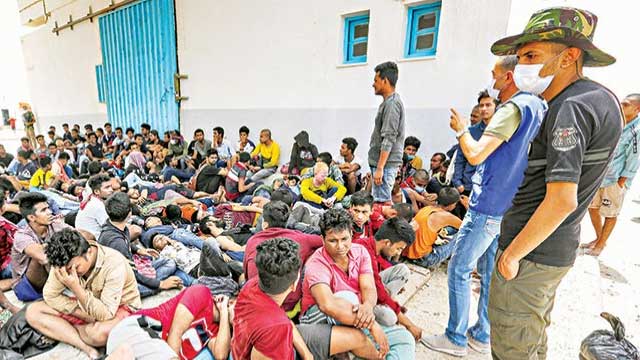The return of Bangladeshis living in European Union member states without any legal rights and the continuation of duty and quotafree access of Bangladeshi products to the European Union markets following the graduation of the country from Least Developed Country status of the UN are likely to dominate the consultation between the block and the Bangladesh government set for Tuesday.
Foreign secretary Masud Bin Momen will lead the Bangladesh side in the meeting in which Gunnar Wiegand, managing director for Asia and the Pacific of the European External Action Service, will lead the delegation of the European Union.
The two sides will discuss the current status of the implementation of the standard operating procedures (SOPs) signed by the EU with Bangladesh in 2017 in order to facilitate the return of Bangladeshi citizens staying in the EU member countries in an unauthorised situation after having exhausting legal means to stay.
Over 1,000 Bangladeshi have already returned home under the SOP as the government confirmed their nationality through appropriate mechanism, while the EU sought to send back about 1,400 people home under the mechanism.
The EU’s recently revised draft on the regulations of the Generalised System of Preferences on trade and the progress made with the implementation of the national action plan of Bangladesh on matters, including the labour sector, in connection with the EU’s everything-but-arms (EBA) monitoring mechanism as a precursor to Bangladesh’s bid to obtain GSP plus after 2029 ‘are likely to be discussed in the meeting,’ the foreign secretary told New Age on Saturday in his office.
The EU’s projected development cooperation package for Bangladesh during 2021-2027 period, taking into account Bangladesh’s definitive graduation from the UN LDC status in 2026 and the possibilities of makng a shift from extending support for development to trade relations, is expected to be discussed during the consultation, said Bangladesh officials aware of the matter.
Bangladesh is likely to request the EU member countries to increase engagements in Myanmar to create conducive environment for safe, dignified, and voluntary return of the Rohingyas of Myanmar to the country for a durable solution to the protracted crisis.
Cooperation in the areas of public health, security, connectivity, efforts for achieving the Sustainable Development Goals in the aftermath of the Covid-19 pandemic and regional issues including Afghanistan are likely to be discussed in the meeting.
The EU is likely to discuss the feasibility of a dedicated dialogue mechanism between the two sides on climate change and green transition issues against the backdrop of the EU’s Green Deal and ‘Fit for 50 [reaching zero emission by 2050]’ enhanced ambitious targets.
The European regional block may share its thoughts on the Indo-Pacific region with Bangladesh as a potential economic and strategic actor in the region.
Foreign secretary Masud Bin Momen will also engage with some members of the European Parliament (MEPs), among others, on the sidelines of the consultation.
Bangladesh head of delegation to the European Union and ambassador to Belgium Mahbub Hasan Saleh, foreign ministry director general Faiyaz Murshid Kazi and representatives of the Prime Minister’s Office, Economic Relations Division and home ministry, among others, will be in the delegation of the country.
It is the fourth round of the Bangladesh-EU diplomatic consultations. The third round of the talks was held in Dhaka in 2018.
Around 24 per cent of Bangladesh’s total trade is conducted with the European Union and bilateral trade between the two sides was $19.3 billion, in 2019, as the EU member countries imported products worth $16.3 billion and exported $3 billion to Bangladesh, according to https://ec.europa.eu/.





